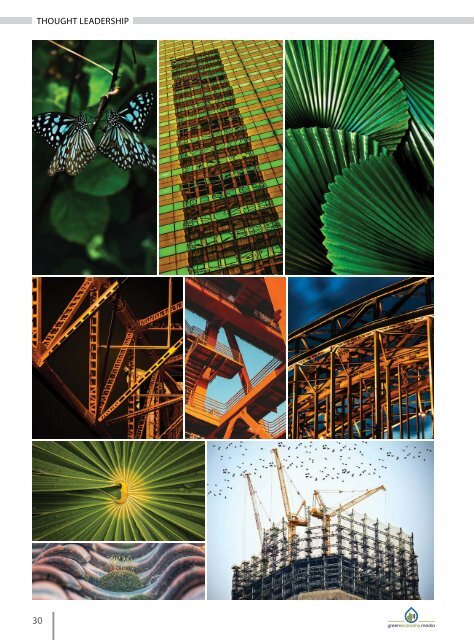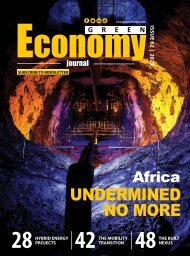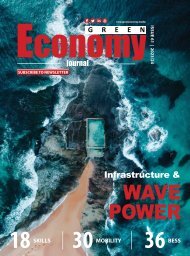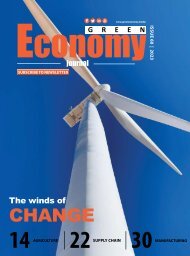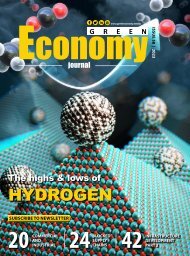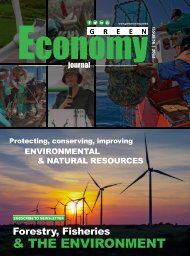Green Economy Journal Issue 63
Create successful ePaper yourself
Turn your PDF publications into a flip-book with our unique Google optimized e-Paper software.
THOUGHT LEADERSHIP<br />
THOUGHT LEADERSHIP<br />
dwellings. As of the most recent data, 2.2-million households<br />
in South Africa live in informal dwellings. Approximately 37% of<br />
South Africa households do not have access to a flush toilet inside<br />
their dwellings. Not surprisingly, this burden falls exclusively<br />
on the poor.<br />
CONCLUSION<br />
On almost all counts the current infrastructure paradigm is diametrically<br />
opposed to the key factors of ecological economics.<br />
The development and maintenance of the constructed ecosystem<br />
(infrastructure) is reductive, ie the exchange of goods and services<br />
between itself and the natural and social ecosystems diminishes<br />
biological and sociological functionality over time. Every metre of<br />
road, wall, pipe, cable and all other constructions requires resources<br />
derived from the natural ecosystem for construction and maintenance<br />
thereby reducing the resource quantity and quality, as does every<br />
litre of fuel or water consumed. The exchange is also unequitable:<br />
the flow is one-dimensional (from the resource base to the resource<br />
consumer), and benefits of that resource use is unequally divided<br />
among population groups and prejudicial to future generations.<br />
The often-repeated claim that “infrastructure investment is key to<br />
the future of cities” is not defensible if that investment is out of line<br />
with ecological economics: so too, is the call for “infrastructure based<br />
on quality-cost-selection” – it is so much more than this.<br />
It is of critical importance that decisionmakers and participants<br />
active in the South African National Infrastructure Plan stop and<br />
review their investment paradigm against the key factors involved<br />
in ecological economics. Failure to do so will unquestionably result<br />
in investment continuing its damaging influence on natural, social<br />
and constructed ecosystems.<br />
Cities account for 80%<br />
of global GDP and will<br />
host 75% of the world’s<br />
population by 2050.<br />
REFERENCES<br />
1 Nelson, A., & Coffey, B., 2019. “What is ‘ecological economics’ and why do we need to talk about it?” The Conversation, November 5, 2019.<br />
2 WEF 2022. BiodiverCities by 2030: Transforming Cities’ Relationship with Nature. World Economic Forum in collaboration with Arup and AlphaBeta.<br />
3 Ibid.<br />
4 Ibid.<br />
5 Constanza, R., 2010. “What is ecological economics?” Yale Insights, May 11, 2010.<br />
6 WEF 2022. BiodiverCities by 2030: Transforming Cities’ Relationship with Nature. World Economic Forum in collaboration with Arup and AphaBeta.<br />
7 Ibid.<br />
8 Ibid.<br />
9 Malte Faber. 2008. “How to be an ecological economist.” Ecological Economics 66(1):1-7.<br />
10 WEF 2022. BiodiverCities by 2030: Transforming Cities’ Relationship with Nature. World Economic Forum in collaboration with Arup and AlphaBeta.<br />
11 Ibid.<br />
12 Mattson L. 1975. “Book Review: Positional Analysis for Decision-Making and Planning by Peter Soderbaum.” The Swedish <strong>Journal</strong> of Economics.<br />
13 Soderbaum, P. 2008. “Understanding Sustainability Economics.” Earthscan, London. ISBN 978-1-84407-627-7. pp.109-110, 113-117.<br />
14 Aslaksen, I.; Bragstad, T.; Ås, B., 2014. “Feminist Economics as Vision for a Sustainable Future”. In Bjørnholt, Margunn; McKay, Ailsa (eds.). Counting on Marilyn Waring: New Advances in Feminist Economics.<br />
Demeter Press/Brunswick Books. pp. 21-36.<br />
15 Erald, K., April 2021. “The Physics of Capitalism”, Sustainable Human Development, The Jus Semper Global Alliance.<br />
16 Webb, R., O’Donnell, T., Auty, K., Bai, X., Barnett, G., Costanza, R., et al, 2023. “Enabling urban systems transformation: co-developing national and local strategies.” Urban Transformations, (2023) 5:5.<br />
17 Ibid.<br />
18 Constanzs, R., 1996. “Ecological economics: reintegrating the study of humans and nature.” Ecological Applications 6:978-990.<br />
19 Constanza et al., 1997. “The value of the world’s ecosystem services and natural capital.” Nature 387:253-260.<br />
20 Weston, P., 2024. “England brings in biodiversity rules to force builders to compensate for loss of nature.” Downloaded: February 13, 2024.<br />
30 31


